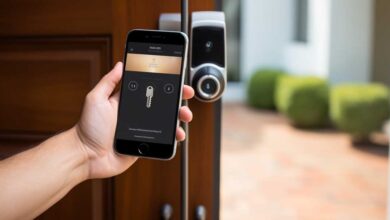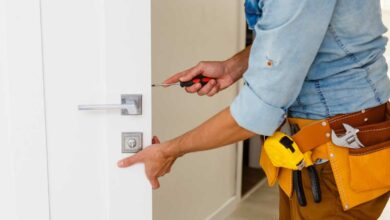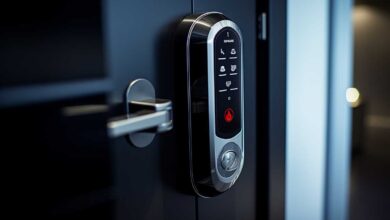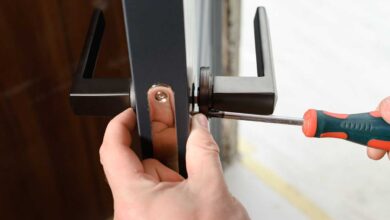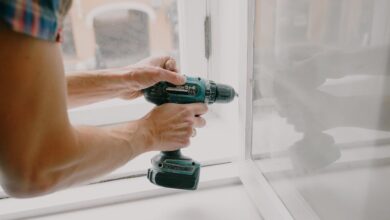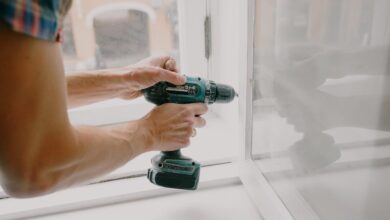Understanding Different Types Of Home Locks
KEY TAKEAWAYS
In the vast world of home security, locks stand as the primary line of defense against potential intruders. According to the FBI, there were approximately 1,117,696 home burglaries in the US in the previous year, demonstrating the critical need for optimum home security measures. With a myriad of options available, understanding the nuances of each type can empower homeowners to make informed decisions.
This comprehensive guide will help you in understanding different types of home locks, their features, and their applications.
Different Types Of Home Locks
Ensuring that your house is secure starts with one fundamental feature: the lock on your door. But with a multitude of options available in the market, it can be challenging to determine which type of lock is the best fit for your home. Here are some of the different types of home locks, their features, benefits, and drawbacks helping you make an informed decision about your home’s security.
Deadbolt Locks
Deadbolt locks have long been the gold standard in residential security. Their design and mechanism offer a level of protection that is superior to the more traditional spring bolt locks. The primary reason for their reliability is the fact that deadbolts cannot be moved to the open position unless the cylinder is rotated, which typically requires a key. This makes them inherently resistant to forceful entries, such as using a credit card or other tools.
Single Cylinder Deadbolt
The single cylinder deadbolt is a prevalent choice among homeowners. It operates with a key on the outside and features a thumb turn on the inside. This design ensures that residents can quickly exit in emergencies without needing a key.
Features And Benefits:
-
Ease Of Use: The thumb turn mechanism allows for quick locking and unlocking from the inside.
-
Safety: In emergency situations, residents can exit swiftly without searching for a key.
-
Security: Provides a robust defense against common break-in methods such as lock picking or bumping.
-
Cost-Effective: Offers a balance between security and affordability.
Double Cylinder Deadbolt
The double cylinder deadbolt is a step up in terms of security. It requires a key to operate from both the inside and outside. This design is particularly beneficial for doors with glass panels or near windows, as it prevents potential intruders from simply breaking the glass, reaching in, and turning the latch.
Features And Benefits:
-
Enhanced Security: By requiring a key from both sides, it adds an extra layer of protection against break-ins.
-
Prevents Easy Entry: Even if an intruder breaks a nearby window, they cannot simply reach in and unlock the door.
-
Versatility: Suitable for doors with glass panels or those near windows.
-
Safety Consideration: While it offers heightened security, homeowners should ensure that a key is easily accessible from the inside in case of emergencies, like fires, to ensure a quick exit.
Drawbacks Of Deadbolt Locks:
-
They can be difficult to install, often requiring professional assistance, which increases the overall cost.
-
Deadbolts often require a separate key from the one used for the doorknob lock, creating a potential hassle for homeowners.
-
Lock picking, although requiring a certain level of skill, is a possible vulnerability for deadbolt locks.
-
Cheaper models of deadbolts may be susceptible to drilling.
Knob Locks
Knob locks are commonly found on exterior doors in conjunction with deadbolts. They feature a locking mechanism within the knob itself.
Benefits Of Knob Locks
-
Convenience: Easy to install and use.
-
Versatility: Suitable for both interior and exterior doors.
However, relying solely on knob locks for external security is not recommended as they can be easily broken with force.
Lever Handle Locks
Designed with a large push-down style handle, lever handle locks are often used for inner doors in commercial settings due to their ease of use.
Key Features
-
Accessibility: Especially useful for people with disabilities.
-
Design: Modern and ergonomic, adding aesthetic value to interiors.
Padlocks
A versatile and portable option, padlocks come in a variety of sizes and are not permanently attached to anything.
Types Of Padlocks
-
Combination Padlock: Uses a number sequence as a key.
-
Keyed Padlock: Requires a traditional key to unlock.
Cam Locks
Typically found in filing cabinets and mailboxes, cam locks are cylindrical and operate with a rotating cam mechanism.
Benefits Of Cam Locks
-
Compact Design: Suitable for tight spaces.
-
Variability: Comes in different lengths to suit various thicknesses of materials.
Mortise Locks
Mortise locks are often found in older homes and require a pocket—the mortise—to be cut into the door where the lock is fitted.
Key Features
-
Durability: Built to last with a robust design.
-
Security: Offers a higher level of security compared to other traditional locks.
Smart Home Security Solutions
The evolution of technology has paved the way for advanced home security solutions that integrate seamlessly with smart home systems. These solutions offer homeowners enhanced control, convenience, and peace of mind.
Smart Door Locks
Smart door locks offer homeowners the ability to lock and unlock their doors using a smartphone, tablet, or smart home system. Some of the standout features include:
-
Remote Access: Lock or unlock your door from anywhere in the world.
-
Guest Access: Grant temporary access to guests without the need for physical keys.
-
Activity Logs: Monitor who enters and exits your home with time-stamped records.
-
Integration: Seamlessly integrate with other smart home devices for a cohesive security system.
Electronic Door Locks
Electronic door locks operate using a combination of keypads, touchscreens, or RFID (Radio Frequency Identification) systems. Key features include:
-
Keyless Entry: Eliminate the need for traditional keys, reducing the risk of lost or stolen keys.
-
Customizable Codes: Set unique codes for different users, allowing for personalized access.
-
Anti-Tamper Alarms: Some models come equipped with alarms that sound if an unauthorized attempt is made.
-
Battery Backup: Ensures the lock remains operational even during power outages.
Electronic Locks
With the advent of technology, electronic locks have gained popularity. They use an electronic current to keep the bolt in place and can be connected to a home’s control system.
Benefits Of Electronic Locks
-
Keyless Entry: Operated via a touchscreen or keypad.
-
Remote Access: Some models allow homeowners to lock or unlock their doors remotely.
Frequently Asked Questions
We have addressed some of the most commonly asked queries to help you in understanding different types of home locks.
Why are deadbolt locks considered more secure than regular locks?
Deadbolt locks boast a unique mechanism that sets them apart from traditional spring bolt locks. Their design ensures that the bolt cannot be forced back into the door, making it resistant to forceful entries. This means that unless the cylinder is rotated, typically with the correct key, the door remains securely locked, offering homeowners an added layer of protection against break-ins.
Is it advisable to install both a single and double cylinder deadbolt on the same door?
Installing both types on a single door can be redundant. The choice between the two hinges on the door’s specific needs. For doors with glass panels or situated near windows, a double cylinder offers added security, preventing intruders from reaching in to unlock. However, for safety reasons, especially in emergencies, ensure that a key is readily accessible from the inside.
How often should I replace or upgrade my deadbolt lock?
Deadbolts are built for longevity, but like all mechanisms, they can wear over time. It’s prudent to conduct a thorough inspection of your deadbolt annually. If you observe any signs of wear, malfunction, or if it becomes increasingly susceptible to tampering techniques like picking or bumping, it’s time to consider a replacement or an upgrade.
Can deadbolt locks be integrated into smart home systems?
Absolutely. The evolution of home security has seen the emergence of smart deadbolt locks. These modern locks can seamlessly integrate with various smart home systems, offering features like remote access, real-time monitoring, and even voice control. It’s a fusion of traditional security with the conveniences of modern technology.
Are double cylinder deadbolts legal everywhere?
Not necessarily. While double cylinder deadbolts offer enhanced security, they can pose safety risks, especially in emergencies where a swift exit is crucial. Some regions have building codes that prohibit their use due to these concerns. Before installation, it’s essential to consult local regulations and building codes.
How can I ensure my deadbolt lock offers the best security?
Opting for high-quality deadbolt locks from established and reputable manufacturers is the first step. Proper installation is equally crucial; if possible, enlist the services of a professional locksmith. Regular maintenance and periodic checks will ensure the lock’s mechanism remains robust and functions optimally, providing you with peace of mind.
Getting The Right Home Lock
In the realm of home security, understanding the intricacies of various lock types is paramount. Whether it’s the robust deadbolt or the technologically advanced electronic lock, each serves a unique purpose. By equipping oneself with this knowledge, homeowners can ensure they select the best lock to safeguard their sanctuaries.
Discover more about how to keep your house and family safe by reading our in-depth guide on the risks of not using strong enough locks. For additional information, visit Security Forward and explore our resources and guides.
